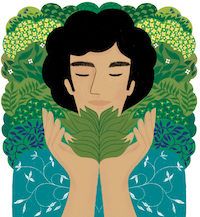In the Pali Canon, the Buddha describes five hindrances, or mental obstacles, that arise during meditation and impede the cultivation of insight, as well as their accompanying antidotes. The first hindrance is sensual desire, which, as one sutra points out, misdirects our attention. Driven by greed or craving for pleasure, we forget what we should remember and focus on what we’d do well to forget—at least for the duration of our meditation—and the result is often unskillful action. Therefore, the antidote is to change our focus. A classic example is to reflect on the unattractiveness of the body (seeing it as a sack filled with blood and pus, or as a future corpse) as an antidote to lust. Another remedy is to guard the senses by focusing strongly on the meditation object: our breath, a mantra, or visualization on a deity, instead of the object we’re craving and think we must have. As the Maha-Assapura Sutta reminds us, being under the spell of sensual pleasure is like being perpetually in debt, which robs us of our peace of mind. But we pay that mental debt by recognizing that in each moment we have just the right amount of all that we need—neither too much nor too little of what nourishes our body and mind.
-
“There’s no such thing as a pure thought without desire. After all, the Buddha said, ‘All things—all dhammas—are rooted in desire.’… We have this mass of desires and thoughts and intentions that we’ve got to train, so we use the whole citta—the whole mind, the whole heart—to train the heart and the mind.” —Thanissaro Bhikkhu

-
Tip: First, pay close attention and notice when sensual desire comes up in your mind. Then ask yourself: “What is causing this desire?” When it fades, ask: “Where did it go?” What does this observation tell you about the nature of sensual desire? What is the result?

-
“Because they want to sell their products, advertisers water the seed of craving in you; they want you to consume so that you will have sensual pleasure. But sensual pleasures can destroy you. What we need is understanding: mutual understanding, trust, love, and emotional and spiritual intimacy.” —Thich Nhat Hanh
-
Tip: There’s nothing inherently wrong with sensual desire. It’s our addiction to that hit of pleasure that keeps us hooked—and imprisoned. Reflect on whether what you think you want is actually what you need. Ask yourself whether it will give you the happiness that you seek and whether it will last.
-
“If you have very strong sexual desire, or a craving, then look at the whole picture … reflect, take it all in, and ask, ‘Okay, do I really want to follow this? What am I actually looking for?’ Usually what we’re looking for is a sense of happiness, a sense of fullness, and a sense of peace.” —Ayya Anandabodhi
♦
This is the first installment of our series on the five hindrances—sensual desire, ill will, sloth/torpor, anxiousness, and doubt—and their respective antidotes. A printable version is available here.
Thank you for subscribing to Tricycle! As a nonprofit, we depend on readers like you to keep Buddhist teachings and practices widely available.
